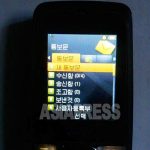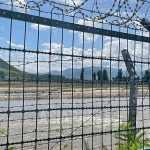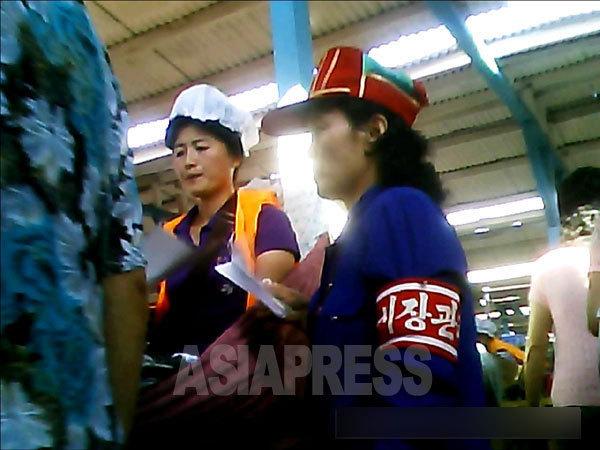
In early August, the Kim Jong-un regime suddenly issued a proclamation ordering a ban on the use of foreign currency and that all distribution of goods fall under the management and control of the state. The proclamation said that severe violators of the order would face execution, which shows the state’s strong intent to tighten control over private business activities. The third part of ASIAPRESS’s investigation into the proclamation and its impact focuses on crackdowns on the distribution of goods. (KANG Ji-won / ISHIMARU Jiro)
◆ Proclamation reveals Kim regime’s anti-market policies
According to reporting partners in Yanggang and North Hamgyung provinces in mid-August, the proclamation, which was issued by the Ministry of Social Security, was entitled: “In Regards to the Thorough Ban on Goods Transactions Outside of Government Control and the Circulation of Foreign Currency.”
With the release of the proclamation, the authorities conducted explanatory lectures at neighborhood watch unit meetings and demanded adherence to its orders. Based on reports from multiple reporting partners, the main points of the proclamation can be summarized as follows:
〇 A strict ban on the use of foreign currency.
〇 Those involved in the retail and wholesale of state-owned food and goods handled by trading companies must register their activities with “commerce management bureaus” and preregister the food and products they intend to sell before engaging in sales activities. In principle, all sales must go through state-owned distribution networks, including state-run shops.
〇 The proclamation is aimed at ensuring that the prices, transport and storage of goods and food are not managed at the whim of private sellers.
〇 The act of a private citizen hiring someone else is considered an anti-socialist act and any violations will be strictly suppressed.
※ Neighborhood watch units are North Korea’s lowest administrative units and are typically made up of 20-30 households. The units take orders from local district offices and report on what people are doing and thinking to the authorities.
Below, ASIAPRESS has added some additional explanations regarding the above.
“Commerce management bureaus” are departments within people’s committees (local governments) that manage the distribution of consumer goods. The bureaus oversee “market management offices,” which manage and monitor state-run markets, which are also referred to as “jangmadang.”
“State-owned food” generally refers to crops produced by collective farms and imported food. There are times when authorities grant permission for food supplied to factories and companies to be sold to market sellers. Starting 3-4 years ago, the government banned the siphoning off of food produced in farms by private citizens and market sellers, and severely cracks down on violators of the ban.
In the run-up to the start of the COVID-19 pandemic in January 2020, trading companies largely sold goods and food imported from China to domestic markets, earning significant amounts of money in the process. The companies also handle the sale of food and consumer items, regardless of whether they are locally produced or imported. In Pyongyang and other areas, the wealthy entrepreneurial class, otherwise known as the “donju,” have long dominated the distribution of these goods.
In principle, North Korea’s socialist system has precluded any private employment; however, after the country’s economic collapse in the 1990s, the market economy flourished, leading the government to turn a blind eye to private employment outside of government control across a wide range of sectors. The “donju” have again played the main role in the spread of private employment through collusion with those in power.
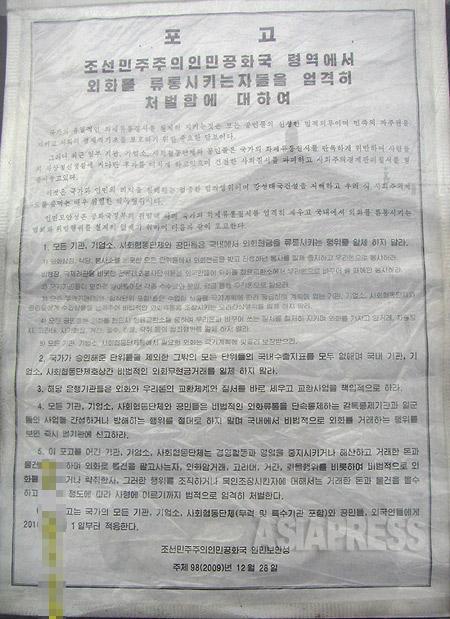
◆ The government states it will “not forgive” anyone violating its orders
While the proclamation reveals the Kim Jong-un regime’s “anti-market” policies, such policies are nothing new. In 2019, the regime had already begun intensifying efforts to suppress private economic activities across the country.
Then, in April 2021, the central government ordered strict controls to be imposed on private economic activities and crackdowns began, with even privately run restaurants being forced to close. It became impossible for businesspeople to hire others to help in small-scale business activities, such as selling food like bread and rice cakes, or even making clothes or transporting items by handcart.
The reporting partners told ASIAPRESS that these bans followed an order to “intensify socialism” and wage a “struggle against non-socialism and anti-socialism” that was emphasized during the Eight Party Congress in January of that year.
The massive crackdown conducted two years ago was implemented amid anti-disease controls aimed at stopping the movement of people and goods. Urban dwellers were dealt a major blow to their cash income as opportunities to do business or engage in day labor dried up. Among the vulnerable classes in provincial cities, people died of starvation and disease.
Through the recent proclamation, the regime has come out strongly against a phenomenon that has yet to be eliminated: the distribution of goods by private sellers. The proclamation’s mention of execution is a warning to those who fail to adhere to the government’s orders and shows the Kim Jong-un regime’s particular interest in intensifying its crackdowns on private business activities.
In the afternoon of August 30, nine people were publicly executed in Hyesan, Yanggang Province, although it is unclear whether their executions were related to the proclamation. They were accused of butchering a state-owned cow and distributing its meat for sale.
◆ Street sellers are forced to register their activities and pay market fees
Then, what kind of impact has the proclamation had on markets in North Korea? Several reporting partners in Yanggang Province provided the following reports:
“After the proclamation was issued, even those who sell goods near the markets must register themselves with ‘market management offices’ or they can’t sell things. There are a lot of people who come out to sell goods on the streets when the markets are about to close, but unregistered sellers have their entire stock confiscated by enforcers. The authorities conduct checks several times a day to confirm whether sellers inside and outside the markets are registered.
“You must pay market fees everyday once you’re registered. While the cost differs depending on the type of business, market fees range from KPW 250 to 500. The proclamation and the crackdowns are aimed at increasing the state’s coffers, in my view.”
※ KRW 10 equals around KPW 66.
“In the past, farmers sold vegetables and other food they grew in their gardens to market sellers, but now the authorities are cracking down on people who try to sell large amounts of their crops, saying that it goes against the proclamation.”
While what is happening near the markets is what gets noticed, the authorities’ crackdowns on small-scale business activities are just the tip of the iceberg. The reporting partners say that the real target of the crackdowns is somewhere else:
“The goal (of the crackdowns) is to eliminate the donju.” (To be continued in the next installment)
※ ASIAPRESS communicates with its reporting partners through Chinese cell phones smuggled into North Korea.
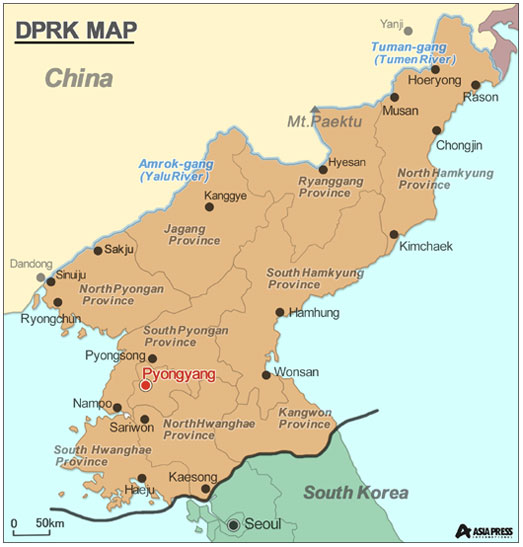
- <Inside N. Korea>Government calls on people to “repay the Supreme Leader’s hard work” during Kim Jong-un’s visit to Russia and mobilizes people for farmwork and construction projects
- <Inside N. Korea> People increasingly interested in Kim Jong-un’s daughter following continuous appearances in state-run media…Several people investigated for claiming that “the era of a female Supreme Leader has arrived”
- <Inside N. Korea>Kim Jong-un orders start of operation to eliminate private medical activities, with a “secret vote” leading to arrests…The state also aims to revive its control over the medical sector
- Who is starving in North Korea in 2023 and why? Analyzing the situation through Amartyra Sen’s theories on famine ISHIMARU Jiro
- <Breaking News>Kim Jong-un regime restarts public executions…Nine people shot to death in Hyesan City on August 30 according to witness
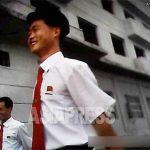
![[Video Report] Why Do N.Korean Women Care About Looks? "I want to get attention from the guys.”](https://www.asiapress.org/rimjin-gang/wp-content/uploads/2017/06/333-150x150.jpg)

![<Inside N. Korea> The Deteriorating Plight of the People (2) Kim Regime Prioritizes Order Over Welfare [ISHIMARU Jiro]](https://www.asiapress.org/rimjin-gang/wp-content/uploads/2021/07/202107-dandong-03_logo-150x150.jpeg)
